Related Research Articles

Aaron Dupree Tippin is an American country music singer, songwriter and record producer. Initially a songwriter for Acuff-Rose Music, he gained a recording contract with RCA Nashville in 1990. His debut single, "You've Got to Stand for Something" became a popular anthem for American soldiers fighting in the Gulf War and helped to establish him as a neotraditionalist country act with songs that catered primarily to the American working class. Under RCA's tenure, he recorded five studio albums and a Greatest Hits package. Tippin switched to Lyric Street Records in 1998, where he recorded four more studio albums, counting a compilation of Christmas music. After leaving Lyric Street in 2006, he founded a personal label known as Nippit Records, on which he issued the compilation album Now & Then. A concept album, In Overdrive, was released in 2009.
"Mountain of Love" is a song written by Harold Dorman. Dorman released his version as a single in 1960. It was originally recorded in late 1959 at the Royal Recording Studios in Memphis before the backing vocals were overdubbed. It performed well, spending 19 weeks on the Billboard Hot 100 chart, peaking at No. 21 in May 1960, while reaching No. 7 on the Billboard Hot R&B Sides chart, and No. 25 on Canada's "CHUM Hit Parade". The song was his only top forty hit on the Billboard Hot 100 and was the highest-charting single of his career.
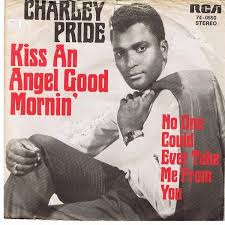
"Kiss an Angel Good Mornin'" is a song written by Ben Peters, and recorded by American country music artist Charley Pride. It was released in October 1971 as the first single from the album Charley Pride Sings Heart Songs. The song has since become one of his signature tunes and was his eighth song to reach number one on the country charts. It was also Pride's only single to reach the Top 40 on the pop charts, peaking at #21 on the Billboard Hot 100, and also went into the Top Ten of the Adult Contemporary charts. It also reached #19 on the U.S. Cash Box Top 100. The song spent four months on the pop chart, longer than any of his other hits. Billboard ranked it as the No. 74 song for 1972.

"You've Got to Stand for Something" is a song co-written and recorded by American country music singer Aaron Tippin. It was released in October 1990 as his debut single and the title track to his album You've Got to Stand for Something. It reached the top ten on the country singles chart in early 1991. Tippin wrote the song with Buddy Brock. Charley Pride later recorded the song in 1992 and released it as a single that year.
"Please Help Me, I'm Falling" is a 1960 song written by Don Robertson and Hal Blair and first recorded by Hank Locklin. The single was Locklin's most successful recording and was his second number one on the country charts. "Please Help Me, I'm Falling" spent 14 weeks at the top spot and spent nine months on the country chart and crossed over to the Hot 100 peaking at number eight.

"Is Anybody Goin' to San Antone" is a song written by Glenn Martin and Dave Kirby, and recorded by American country music artist Charley Pride. It was released in February 1970 as the first single from the album Charley Pride's 10th Album. The song was Pride's third number one in a row on the country charts. The single spent two weeks at number one and a total of 16 weeks on the country chart.
"Wonder Could I Live There Anymore" is a song written by Bill Rice, and recorded by American country music artist Charley Pride. It was released in May 1970 as the first single from the album From Me to You. The song was Pride's fourth number one in a row on the country charts. The single went to number one for two weeks and spent a total of 15 weeks on the top 40.
"I Can't Believe That You've Stopped Loving Me" is a song written by Dallas Frazier and A.L. "Doodle" Owens, and recorded by American country music artist Charley Pride. It was released in September 1970 as the second single from the album From Me to You. The song was Pride's fifth number one on the country charts. The single stayed at number one for two weeks and spent a total of fifteen weeks on the country charts.
"Whole Lotta Love on the Line" is a song co-written and recorded by American country music artist Aaron Tippin. It was released in April 1994 as the fourth single from the album Call of the Wild. The song reached No. 30 on the Billboard Hot Country Singles & Tracks chart. The song was written by Tippin and Donny Kees.

The discography of American country music artist Charley Pride contains 75 singles, one other charting song, two promotional singles, one featured single and 11 music videos. Pride signed his first recording contract with RCA Victor in 1966. His first two singles failed to become hits. His third single, "Just Between You and Me," became a hit when it reached the top ten of the country charts. Pride had several more top ten hits over the next several years until he had first chart-topper in 1969. The single, "All I Have to Offer You ," reached number one on the Billboard Hot Country Songs chart and spent 17 weeks charting. This was followed by five more number one hits, including "Is Anybody Goin' to San Antone." All of these singles also reached low-end positions on the Billboard Hot 100.
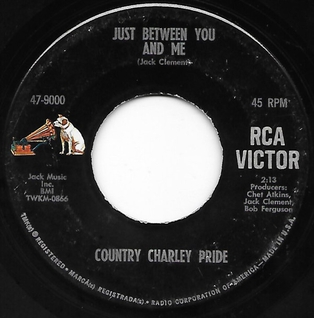
"Just Between You and Me" is a song written by Jack Clement, and recorded by American country music artist Charley Pride. It was released in September 1966 as the first single from the album Pride of Country Music. The song was Pride's third single and his first major hit as a recording artist.
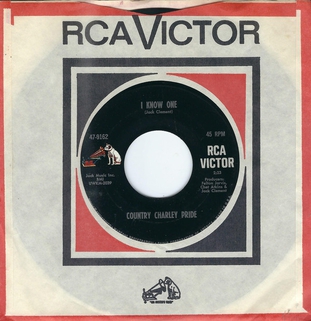
"I Know One" is a song written by Jack Clement, and recorded by American country music artist Charley Pride. It was released in March 1967 as the second single from the album Pride of Country Music. The song was Pride's fourth single and his second major hit as a recording artist.
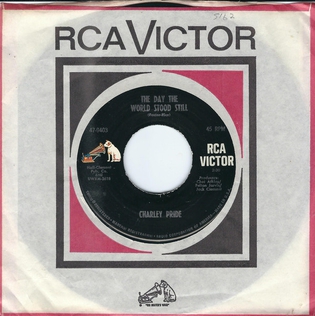
"The Day the World Stood Still" is a song written by Jerry Foster and Bill Rice, and recorded by American country music artist Charley Pride. It was released in December 1967 as the second single from the album The Country Way. The song was Pride's sixth single and his fourth major hit as a recording artist.

"The Easy Part's Over" is a song written by Jerry Foster and Bill Rice, and recorded by American country music artist Charley Pride. It was released in April 1968 as the first single from the album Songs of Pride...Charley That Is. The song was Pride's seventh single and his fifth major hit as a recording artist.

"Let the Chips Fall" is a song written by Jack Clement, and recorded by American country music artist Charley Pride. It was released in September 1968 as the first single from the album The Sensational Charley Pride. The song was Pride's eighth single and his sixth major hit as a recording artist.

"Let Me Live" is a song written by Ben Peters. It was originally recorded by American country music artist Charley Pride. The song was produced by Jack Clement and was released as a single via RCA Victor Records in 1971. The song became a top 40 hit on the Billboard country chart and in Canada. It was Pride's only gospel recording to become a major hit.
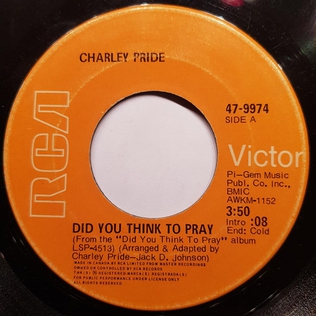
"Did You Think to Pray" Recorded by Charley Pride, the song was produced by Jack Clement and was released as a single via RCA Victor Records in 1971. Many sites credit Charley Pride with writing the song with assistance from Jack D. Johnson, but the lyrics were written by Mary A. Pepper Kidder and the tune by William O. Perkins. The song became a minor hit on the Billboard country chart. It was later released on album of the same name.

Charley is the twentieth studio album by American country music artist Charley Pride. It was released in May 1975 via RCA Victor Records and was produced by Jack Clement. The record was Pride's twentieth studio album released in his career and contained a total of ten tracks. The album included two singles which became major hits that year on the country chart: "I Ain't All Bad" and "Hope You're Feelin' Me ."

The Happiness of Having You is the twenty-first studio album by American country music artist Charley Pride. It was released in November 1975 via RCA Victor Records and was produced by Jerry Bradley. It was Pride's twenty first studio recording released in his music career and contained ten tracks. The album included two singles which became major hits on the country charts: "My Eyes Can Only See as Far as You" and the title track.

You're My Jamaica is a studio album by American country music artist Charley Pride. It was released in August 1979 via RCA Victor Records and contained ten tracks. It was co-produced by Pride and Jerry Bradley. You're My Jamaica was the twenty sixth studio project released in his music career. Both its singles became major hits on the country charts in the United States and Canada: "Missin' You" and the title track. The record would receive positive reviews from music publications following its release.
References
- ↑ Whitburn, Joel (2004). The Billboard Book Of Top 40 Country Hits: 1944-2006, Second edition. Record Research. p. 276.
- ↑ "Charley Pride Chart History (Hot Country Songs)". Billboard.
- ↑ "Charley Pride Chart History (Hot 100)". Billboard.